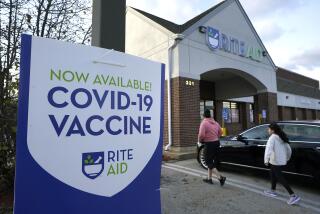Arco Sells 400 Stations on East Coast to Shell
Atlantic Richfield said Friday that it agreed to sell about 400 gas stations in eight Eastern states and Washington to Shell Oil, which will make Shell the nation’s biggest gasoline retailer. The sale price wasn’t disclosed.
Oil industry analysts said the sale would significantly strengthen Shell’s market position on the East Coast, where it is the second-biggest gasoline retailer with 10.5% of the market. Amoco ranks first in the region with 19.9%.
Los Angeles-based Arco previously announced plans to sell its assets east of the Mississippi as part of a plan to restructure the company and concentrate its gasoline retailing on the West Coast. The 400 stations are located in Connecticut, Delaware, Maryland, Massachusetts, New Hampshire, New Jersey, Rhode Island, Virginia and Washington. The sale doesn’t include the 270 stations in those states that Arco supplies but doesn’t own.
Rule of Thumb
If completed, the sale will make Shell the biggest gasoline marketer in Connecticut, Maryland and Massachusetts. It will be the second largest in Delaware and New Jersey.
In each of the states, Shell’s market share would be boosted to at least 5% of all gasoline sales, making its retail operations highly profitable, analysts said. “The rule of thumb in the industry is that anything above 5% is gravy--it goes directly into operating profits,” said Bruce Lazier, an analyst with Prescot Ball in New York.
Arco said that, although it has signed a letter of intent with Shell, a formal agreement hasn’t been reached. It also said that any agreement would be subject to approvals from the Federal Trade Commission and the Justice Department. A spokesman said a formal agreement was expected soon.
Analysts said it appeared that the deal was better for Shell than for Arco, which had wanted to sell the 400 stations, an additional 750 stations in New York, Pennsylvania and Illinois, and its Philadelphia refinery as a package. “Shell does not overpay; they are very astute buyers,” said Rosario Ilacqua, an analyst with L. F. Rothschild Unterburg Towbin in New York.
“These are probably the better stations,” Lazier agreed.
Analysts were reluctant to put a price tag on the sale, saying it depended on the location of the stations and the amount of gasoline that each station pumped, as well as the success of its service business or convenience store. One industry source said the deal could be worth as much as $1 a gallon, or $923 million, but another source said the deal was probably worth only half that.
The company said it plans to make another announcement Sunday, but it would not say whether it will concern the sale of more assets.
More to Read
Inside the business of entertainment
The Wide Shot brings you news, analysis and insights on everything from streaming wars to production — and what it all means for the future.
You may occasionally receive promotional content from the Los Angeles Times.










